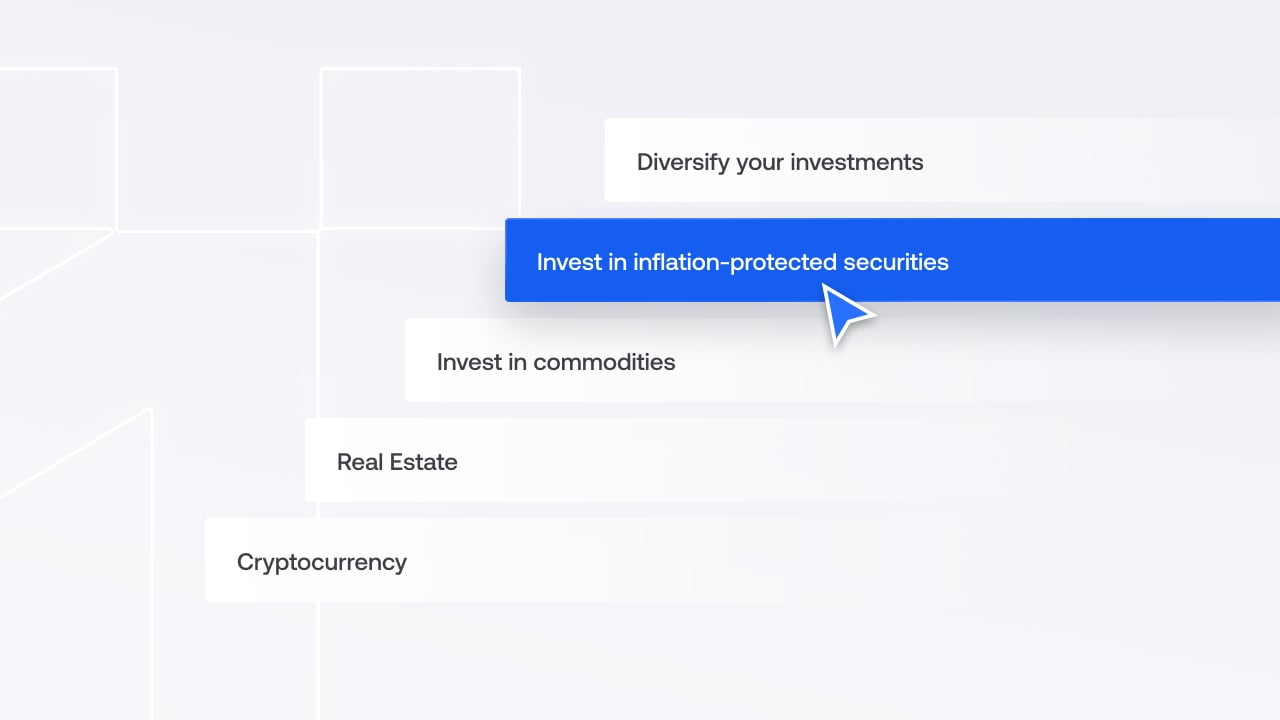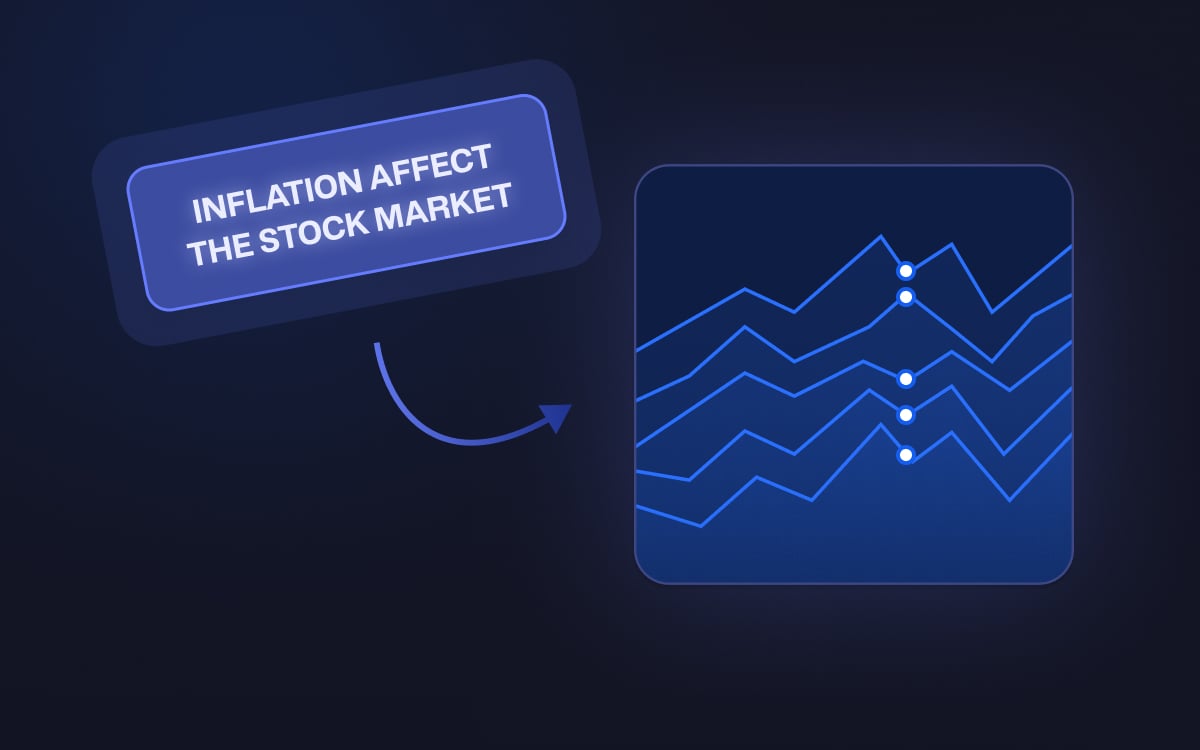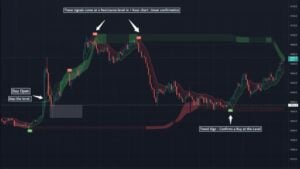Inflation is an important economic concept that affects the stock market in various ways. Inflation measures the rate at which the prices of goods and services increase over time.
Here’s an example. According to the US Inflation Calculator, a loaf of white bread in January of 1988 cost approximately 59¢. In January of 2024, that same loaf of bread cost $2.99 on average. In the 36 years, the bread price increased by $2.4 or rose by ~400%.
Key Takeaways:
- When inflation rises, money’s purchasing power decreases, negatively affecting the stock market.
- Inflation influences the cost of borrowing money, the cost of goods and services, and the rate of return on investments.
- Investors invest in less volatile assets instead of stocks during inflation.
- The Federal Reserve may raise interest rates to reduce inflation, which can lead to higher borrowing costs for companies.
How Does Inflation Affect the Stock Market?
Inflation can affect the stock market by influencing investors’ decisions. When inflation is high, investors may be more likely to invest in less sensitive assets, such as bonds or gold. This can lead to decreased demand for stocks, which can cause stock prices to fall.
But there’s an indirect connection, too. When inflation rises, the cost of goods and services increases, leading to higher production costs for companies. This leads to lower profits, which can cause stock prices to fall.
Additionally, rising inflation increases the cost of borrowing money. This can make it more difficult for companies to access capital, leading to lower stock prices.
Finally, inflation can influence the decisions of the Federal Reserve. When inflation is high, the Federal Reserve may raise interest rates to reduce inflation. This can lead to higher company borrowing costs and lower stock prices.
In the 1970s, particularly from 1969 to 1982, the United States experienced a period of high inflation. This led to poor returns on shares, with the real (adjusted for inflation) return on shares falling by 11.6% during this period. [1]
Enough bad stuff. What happens when inflation decreases?
When inflation is low, the cost of goods and services decreases, increasing consumer spending. This can affect the stock market positively, as companies may experience increased sales and profits.
Additionally, the cost of borrowing money decreases, which can lead to lower interest rates. This can make it easier for companies to access capital and positively affect stock market returns.
How Does Inflation Affect Interest Rates?
Inflation is the rate at which the prices of goods and services rise over time. It is measured by the Consumer Price Index (CPI), which tracks the prices of a basket of goods and services. Higher inflation equals lower purchasing power of money.
Interest rates, on the other hand, are the cost of borrowing money. When interest rates are high, borrowing money is more expensive; when interest rates are low, it is cheaper.
The relationship between inflation and interest rates is complex.
Generally, when inflation is high, central banks raise interest rates to slow down the economy and reduce inflation. Higher interest rates make borrowing money more expensive, reducing spending and slowing the economy.
Conversely, central banks will lower interest rates when inflation is low to stimulate the economy. Lower interest rates make borrowing money cheaper, encouraging spending and boosting economic growth.
However, their relationship isn’t always linear.
In some cases, central banks may raise interest rates even when inflation is low or lower interest rates even when inflation is high. The Federal Reserve must consider other economic factors, such as employment and economic growth when setting interest rates.
How to Protect Your Portfolio from Inflation-Induced Volatility?

Inflation is a natural part of the economic cycle but can significantly impact your portfolio. As prices rise, the value of your investments can decrease, leading to volatility in your portfolio. You can take several steps to protect your portfolio from inflation-induced volatility.
1. Diversify your investments.
Investing in various asset classes, such as stocks, bonds, and cash, reduces the risk of your portfolio being affected by inflation.
Diversification also helps to spread out your risk so that if one asset class is affected by inflation, the other asset classes may not be.
2. Invest in inflation-protected securities.
These securities, such as Treasury Inflation-Protected Securities (TIPS) and inflation-linked bonds, are designed to protect your investments from inflation. They are linked to the Consumer Price Index (CPI), so the security value rises when inflation rises.
3. Invest in commodities.
Commodities like gold and silver tend to increase in value when inflation rises. This can help to offset the losses in other parts of your portfolio.
4. Real Estate
Real estate tends to increase in value over time and can provide a hedge against inflation. Though, this decision needs to be made with a lot of thought, the real estate prices have been really inflated lately, especially in the States.
5. Cryptocurrency
Some have considered cryptocurrencies, such as Bitcoin, as potential hedges against inflation due to their decentralized and digital nature. Unlike FIAT currencies, they are not governed by a central authority, which theoretically could make them immune to inflationary policies. [2][3]
However, the reality is more complex. Cryptocurrencies have shown significant volatility, and their correlation with broader market indices like the S&P 500 and the Nasdaq has increased. This correlation challenges the notion of cryptocurrencies as reliable inflation hedges.
For instance, Bitcoin has a fixed supply cap and has experienced substantial short-term price fluctuations, making it an unstable hedge against inflation. The same applies to the altcoins.
While cryptocurrencies might offer diversification benefits in an investment portfolio, their effectiveness as a hedge against inflation remains uncertain.
Is it good to invest during inflation?
Investing during periods of inflation can be a complex decision. While the conventional wisdom might suggest caution due to the potential for decreased purchasing power and increased costs, there are opportunities for savvy investors.
1. Strategic Approaches
Inflation-Resistant Assets: Some assets tend to hold their value or even appreciate during inflationary times. Real estate and commodities like gold and oil are classic examples. They can act as a hedge against inflation, preserving the real value of your investment.
Stocks with Pricing Power: Investing in companies that can pass increased costs onto consumers without losing demand can be a wise move. These businesses typically have strong brand loyalty or offer essential products and services.
Floating Rate Bonds: Unlike fixed-rate bonds, floating-rate bonds can adjust to rising interest rates, making them less susceptible to inflation.
2. Considerations
Risk Tolerance: Your willingness to accept risk is crucial. Inflationary periods can be volatile, and not all investments will perform well.
Long-Term Perspective: It’s important to have a long-term investment strategy during inflation. Short-term market fluctuations can be more pronounced, but long-term investments provide stability and growth potential.
Don’t forget that there’s always money to be made if you take the right steps.
Companies like Walmart reported a drop in profits in the first three months of 2022, naming higher costs due to inflation as a major reason.
On the other hand, sectors like oil and natural gas benefited from inflation, as disruptions led to higher prices and increased revenue for companies like Exxon Mobil, whose stock price jumped over 50% in the same year. [4]
Which sectors benefit from inflation?
Certain sectors and types of stocks have historically shown resilience during high inflation.
For example, during the hyperinflation period in Germany in the 1920s, the stock market was a relatively good investment compared to holding money in the bank.
Companies dealing in physical goods such as food, steel, and coal could adjust their prices with inflation, maintaining profitability. [1]
This example demonstrates that in extreme cases of hyperinflation, stocks in certain sectors may still offer a hedge against the eroding value of currency.
1. Energy Sector: The energy sector has historically been a top performer during high-inflation periods. This trend continues in 2024, partly due to geopolitical events such as the Russia-Ukraine conflict, which increased oil and gas prices.
As a result, energy stocks, particularly those in oil companies, have seen positive returns even during inflationary times.
2. Consumer-grade Tech: Technology giants like Microsoft (MSFT), Nvidia (NVDA), and Alphabet (GOOGL) have shown resilience.
Microsoft, for instance, benefited from advancements in AI and cloud computing. Additionally, consumer goods companies like Procter & Gamble (PG) and Johnson & Johnson (JNJ) have maintained steady performance, partly due to their ability to provide essential products that remain in demand regardless of economic conditions.
3. Financial Technology and Luxury Brands: Companies like MercadoLibre (MELI) have thrived, thanks to their digital payment platforms, which have seen significant user growth.
Similarly, luxury brands such as Hermès have demonstrated strong performance due to their exclusive pricing power and high-net-worth customer base, which tends to be more insulated from inflationary pressures.
4. Real Estate Investment Trusts (REITs): Certain REITs, such as Boston Properties (BXP), have shown potential despite the challenges faced by the commercial real estate sector.
It’s important to note that no guaranteed “inflation-proof” stocks exist. Investment strategies should be based on market analysis, individual financial goals, and risk tolerance.
What is the status of inflation in 2024?
As of January 2024, the annual inflation rate in the United States stood at 3.09%. This is a significant decrease from the peak of 9.06% in June 2022. [5]
While a moderate inflation rate of around 3% is generally considered manageable, it can still erode purchasing power and introduce uncertainties, especially for businesses trying to estimate future costs.
In the broader context of economic health, inflation rates are critical. For example, countries experiencing hyperinflation often face economic collapse. The Federal Reserve targets a 2% inflation rate, balancing the need for economic stability with the government’s inclination towards higher inflation. [6]
The relationship between inflation rates and interest rates is also noteworthy. In a healthy economy, interest rates typically exceed inflation rates, influencing various economic activities and decisions.
Conclusion
In conclusion, inflation can have a significant impact on the stock market. Inflation can cause stock prices to rise, as companies may be able to increase their profits due to higher prices.
However, inflation can also lead to higher interest rates, making it more expensive for companies to borrow money and decreasing stock prices. Therefore, it is important for investors to be aware of the potential effects of inflation on the stock market and to adjust their investment strategies accordingly.
Sources: Economics Help, IG UK, Money






